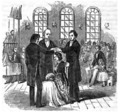Portal:Latter Day Saint movement
|
Welcome to the portal of The Latter Day Saint movement
Introduction The Latter Day Saint movement (also called the LDS movement, LDS restorationist movement, or Smith–Rigdon movement) is the collection of independent church groups that trace their origins to a Christian Restorationist movement founded by Joseph Smith in the late 1820s. Collectively, these churches have over 17 million nominal members, including over 17 million belonging to the Church of Jesus Christ of Latter-day Saints (LDS Church), 250,000 in the Community of Christ, and several other denominations with memberships generally ranging in the thousands of members. The predominant theology of the churches in the movement is Mormonism, which sees itself as restoring again on Earth the early Christian church; an additional doctrine of the church allows for prophets to receive and publish modern-day revelations. A minority of Latter Day Saint adherents, such as members of Community of Christ, have been influenced by Protestant theologies while maintaining certain distinctive beliefs and practices including continuing revelation, an open canon of scripture and building temples. Other groups include the Remnant Church of Jesus Christ of Latter Day Saints, which supports lineal succession of leadership from Smith's descendants, and the more controversial Fundamentalist Church of Jesus Christ of Latter-Day Saints, which defends the practice of polygamy. (Full article...) General images -The following are images from various Latter Day Saint movement-related articles on Wikipedia.
Selected articleNo Man Knows My History: The Life of Joseph Smith is a 1945 book by Fawn M. Brodie that was one of the first significant non-hagiographic biographies of Joseph Smith, the progenitor of the Latter Day Saint movement. No Man Knows My History was influential in the development of Mormon history as a scholarly field. However, scholars have since criticized the book for its methodological deficiencies, factual errors, and overt hostility to Smith. No Man Knows My History has never been out of print, and 60 years after its first publication, its publisher, Alfred A. Knopf, continues to sell about a thousand copies annually. For a revised edition released in 1971, Brodie added a supplement incorporating psychohistorical commentary. In 1995, Utah State University (USU) marked the 50th anniversary of the book's first publication by hosting a symposium to re-examine the book, its author, and her methods, and in 1996 USU published the symposium papers as a book of essays. (Full article...)Selected location Lees Ferry (also known as Lee's Ferry, Lee Ferry, Little Colorado Station and Saints Ferry) is a site on the Colorado River in Coconino County, Arizona in the United States, about 7.5 miles (12.1 km) southwest of Page and 9 miles (14 km) south of the Utah–Arizona state line. Due to its unique geography – the only place in hundreds of miles from which one can easily access the Colorado River from both sides – it historically served as an important river crossing and starting in the mid-19th century was the site of a ferry operated by John Doyle Lee, for whom it is named. Boat service at Lees Ferry continued for over 55 years before being superseded by a bridge in the early 20th century, which allowed for much more efficient automobile travel. (Full article...)
Selected schismatic histories The Church of Jesus Christ is an international Christian religious denomination headquartered in Monongahela, Pennsylvania, United States. Organized at Green Oak, Pennsylvania, U.S.A. in the year 1862. The church is a Christian Restorationist church and accepts the Book of Mormon as scripture. The church considers itself the gospel restored, or the original church and good news as established by Jesus Christ in the New Testament, restored upon the earth. It also claims to be the spiritual successor to the Church of Christ, organized by Joseph Smith on April 6, 1830. The church sees Sidney Rigdon as Smith's rightful successor following the assassination of Smith because Rigdon was Smith's first counselor in the First Presidency. The church is not officially affiliated with any other church, organization or denomination. As of August 2023, members of the church are located throughout the world including North and South America, Europe, Asia and Africa—for a membership total of 22,992. The Church of Jesus Christ is considered "the third largest Restoration church to have resulted from the 1844 succession crisis", describing Joseph Smith's death that year without a clear line of succession. It has sometimes been referred to as a "Bickertonite church" or "Rigdonite organization" based upon the church's historical succession through William Bickerton and Sidney Rigdon. Some refer to the church as the Pentecostal Mormon church as it has the present operation of the gifts of the Spirit, similar to Charismatic or Pentecostal churches. However, the church does not use these terms in referring to itself. (Full article...)OutlinesRelated portalsKey biographies
Selected image The "Letter of appointment" is a controversial three-page document used by James J. Strang and his adherents in their efforts to prove that he was the designated successor to Joseph Smith as the prophet and president of the Church of Jesus Christ of Latter Day Saints. Sent from Nauvoo, Illinois, on June 19, 1844, to Strang in Burlington, Wisconsin, this letter served as the cornerstone of Strang's claims, which were ultimately rejected by the majority of Latter Day Saints.
Did you know (auto generated)
Selected Anniversaries
Selected quote
TopicsFeatured contentCategoriesWikiProjectsAssociated WikimediaThe following Wikimedia Foundation sister projects provide more on this subject:
Discover Wikipedia using portals | ||||||||||




































